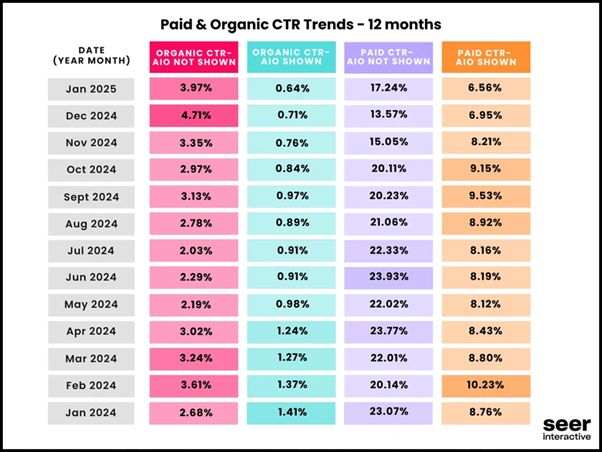So far, February has seen Google making key changes across search, AI, and paid media. Here’s what you need to know to stay ahead.
Google Search
You can now edit GBP product backgrounds using generative AI
Product Studio, Google’s generative AI e-commerce tool, is now available in Business Profiles - having already launched for Google Ads and Merchant Centre.
It can be used to edit and create background imagery for your product shots, providing a clean, professional, and aesthetically relevant scene quickly.
To give this new feature a try, you can access it by selecting the blue ‘Get started’ button in the ‘Transform your product images with AI’ box that appears at the top of the screen when editing your products.
You then upload your product image, wait for the existing background to disappear, pick a theme, and let the AI do its thing. Once you’re happy with your generated background, click ‘Add image to product’ then save the new image.
For e-commerce merchants…
Anything that makes your products look more enticing is a plus in our book, but keep your wits about you. It’s important not to assume this feature always knows best. If you feel the design isn’t quite right for your products or brand then it probably isn’t.
As you should be with any generated content — be discerning in your usage.
Need to verify your Google Business Profile? Check out our step-by-step GBP video verification guide.
Seer study shows the extent AI Overviews is harming CTR
Seer have published a 13-month study in which they tracked click-through rates for organic and paid search results when served with and without AI Overviews.
Results showed that when the SERPs presented an AI Overview, CTR plummeted for both organic and paid search results. While this isn’t strictly a revelation in the marketing world, Seer’s findings show just how damaging Google’s AI SERP feature really is to your traffic.

Source: Seer
The upshot is that the research also confirmed that websites cited within AI Overviews see a substantial boost in CTR.
For publishers…
This research confirms that optimising for visibility in AI Overviews and other generative search tool outputs is mission-critical in realising business potential in the digital sphere.
At TDMP, we’ve been preparing for this shift for some time. We have proactively adapted our approach to ensure our clients maintain strong visibility across both established search engines and emerging AI-driven discovery platforms. Contact us today to learn how we can future proof your digital presence and keep your brand ahead of the curve.
Google's AI Overviews get detailed comparison functionality
It may be just a test, but it has been noticed that AI Overviews is now capable of serving a detailed comparison of two products for highly specific “vs” keywords, such as ‘iphone 15 vs iphone 15 pro’.
The comparison can be expanded to more or less cover the entire SERP, and while sources are cited, the spec-heavy information will likely be enough to discourage users clicking through to learn more.
For publishers…
If your site features a lot of review and comparison content, it’s more important than ever to make it as unique and helpful as possible. In-depth product analysis and testing paired with proof of first-hand author experience will ensure your content is always worth visiting — and ranks well on Google’s SERPs.
Google SEO & content
Originality will be a big focus for Google in 2025
Google’s Gary Illyes has emphasised the importance of content originality in 2025. While there’s some debate over what exactly he means by "original," the key takeaway is that content should offer unique insights or perspectives.
It’s also worth considering that Google may have an underlying motive — indexing more original content provides valuable training data for its AI-driven search features, helping lay the foundation for AI Mode for search in the coming months.
For publishers…
Give your content a distinct voice—not just in style, but through strong opinions and valuable insights. This will set you apart from competitors, even in highly saturated topics.
Conduct original research, offer fresh takes on industry trends, and provide expert analysis that AI-generated summaries can’t replicate.
Google adds several mentions of generative AI to their Search Quality Raters guidelines
In January, Google refreshed their Search Quality Raters guidelines. Although the changes made were widely reported, one flew under the radar until earlier this month.
The refreshed PDF now mentions ‘generative AI’ 14 times, acknowledging that it can be used to create both high and low quality content, but that its role in scaled content abuse and the creation of unoriginal content is a concern.
For publishers…
Despite these negative connotations, the key message in the refreshed document is that bad content will be rated poorly no matter how it is created.
As long as you use AI to augment your content rather than simply making it easier and faster to produce, you’ve got nothing to worry about.
Paid media
More record ad revenue for Google
On February 4th, Google and their parent company Alphabet reported their earnings for Q4 of 2024.
Having already set record year-on-year growth of 10% in Q3 of 2024, Q4 pushed profits even further, with a 10.6% increase in ad revenue. Although this may seem an occasion for the Google team to break out the champagne, growth was actually significantly lower than forecasted – roughly 50% slower than Meta’s paid media growth.
For advertisers…
This means Google Ads and competitors are becoming increasingly competitive platforms for your paid media campaigns. Working in collaboration with PPC experts will ensure maximum return on your ad spend.
Contact us today to develop a strategic, data-driven approach that optimises your budget, enhances ad performance, and maximises conversions.
Reduced visibility for Search Ads with poor navigation landing pages
Google is now taking the user navigation experience of Search Ad landing pages into account when assessing the quality of ads.
Their new prediction model is designed to identify ads that lead to unexpected destinations with unclear or missing navigation options.
Google offered the following example to explain why this is an issue:
‘For instance, if you click on an ad looking for a login page, but land on a promotion instead, a good experience depends on how quickly you can find the login page from there. If it’s not easily accessible you’ll probably return to Google Search to try again, and that’s not time well spent.’
For advertisers…
A focused and user-friendly landing page for your ads has always been essential to maximising conversions and ROI, but lacking in this area may now have a drastic impact on your campaign success.
Review your landing pages from the perspective of your target audience. Do they seem like logical and helpful next steps from your ad? And if another action is required, does the landing page navigation make it as clear and easy as possible to complete?
Read our 20 expert tips for optimising PPC landing pages to help you get started.
Google to introduce 540-day expiration limit for Customer Match
Starting April 7, 2025, Google Ads will enforce a 540-day expiration limit for Customer Match lists across Google Ads and Display & Video 360.
Lists with no expiration or those exceeding this duration will be updated to the 540-day maximum. Advertisers must regularly refresh or update their lists to avoid reduced list sizes and potential campaign interruptions.
For advertisers…
To maintain campaign effectiveness, ensure you update your Customer Match lists before April 7, 2025, by re-uploading fresh customer data. This will prevent disruptions due to expiring lists.
Stay current with TDMP
As search evolves, so should your strategy. Whether you need support with SEO, paid media, or broader digital marketing, TDMP can help — Let’s talk.

